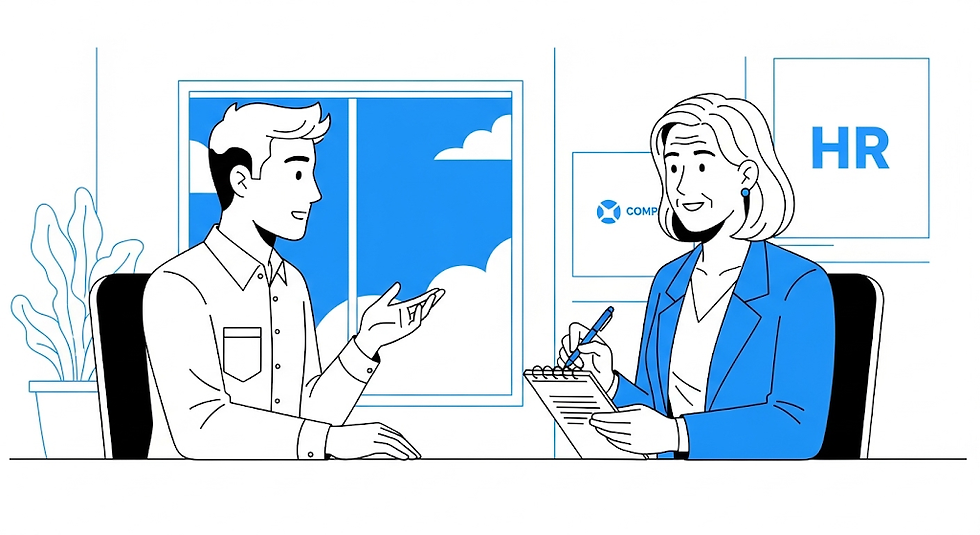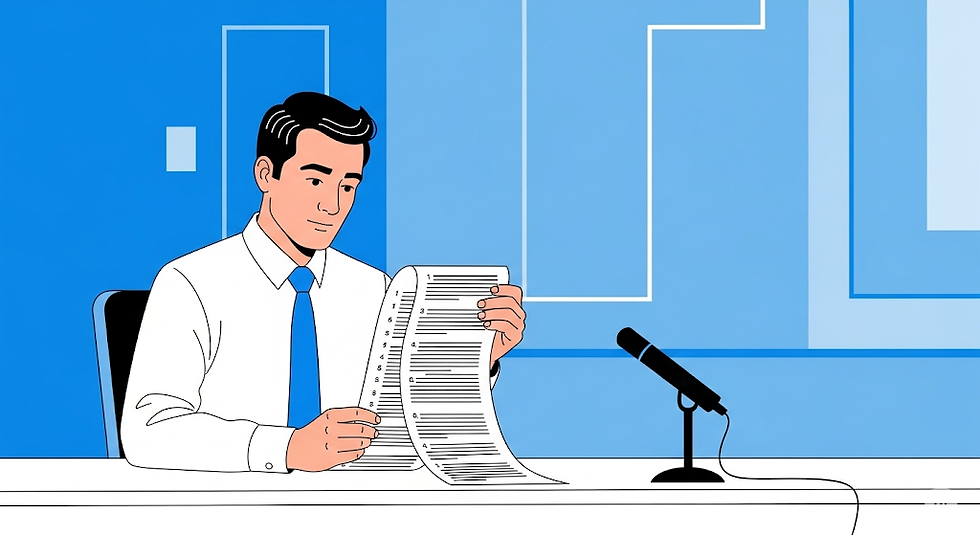Top Tough Interview Questions (How to Answer Them Smartly)
- Thomas Alexander

- 2 hours ago
- 7 min read

Your palms are sweaty, your mind is racing, and just when you think that interview is going much smoother, the hiring manager comes in and asks -
"So....what's your biggest weakness?"
Silence.
At that moment, every candidate has the same thought, "What should I say without ruining my chance?"
If you have ever gone for an interview and felt like your confidence is dropping the second a tricky question was thrown your way then you are not alone. Tough interview questions are designed for that. It is to check how you think under pressure, how self-aware you are, and whether you can turn a difficult situation into an opportunity to grow and shine.
However, here is the good news - with the right strategies, even the hardest interview questions can become your stage. It helps you stand out. So, let’s break down the most challenging questions that recruiters love to ask, why they actually ask them, and how you can answer confidently and with impact.
Why Do Interviewers Ask Tough Questions?

Here you need to clear one thing up: interviewers don’t ask them just to make you nervous. There’s always a purpose behind every question.
They want to test your confidence under pressure
Employers want to see how you think on your feet. Can you stay calm and collected when all the eyes are on you?
They check about your self-awareness
Questions like “What’s your weakness?” check if you honestly know yourself and you can really show growth.
They assess cultural fit
Sometimes the goal isn’t the “right” answer but to understand how your values can go well with the company.
They want to choose the strong candidates
Technical skills can be taught. But here, intelligence, resilience, communication, and problem-solving skills are harder to fake.
You can think of tough interview questions as less of a trap and more of a window. They give recruiters insights into how you think and not just what you know.
How to Prepare for Tough Interview Questions?

You can’t predict the questions that a hiring manager will throw at you. But, you can prepare your mindset to answer confidently. Here’s how:
Know the Interviewer’s Intent
Most tricky questions are designed to test your reasoning. Those are not just to know your answer.
Example: “Why should we hire you?” isn’t about just bragging. It’s about if you really understand the company’s needs. It’s about if you can connect your skills to their problems. |
Build Your Personal Story Bank
You can create about 4–5 short “career stories.” Those include achievements, challenges, leadership moments, failures.
When you are asked about a difficult question, you can pull from these stories instead of getting terrified from the question.
Use the STAR Method
Situation → What was the context?
Task → What were you expected to do?
Action → What did you actually do?
Result → What happened because of it?
It can help you keep your answers structured, logical, and easy to follow.
Practice Out Loud, Not Just in Your Head
Did you know that tough questions often feel different when spoken? You need to rehearse answers verbally so your delivery feels natural.
Bonus: Record yourself. It can help you catch nervous fillers (“uh, like, you know”) before the actual interview. |
Anticipate Industry-Specific Challenges
Tech candidates can face a lot of brain teasers.
Sales candidates are asked to pitch themselves.
Leadership roles may include ethical dilemmas.
When you personalize your preparation to your industry, it gives you an edge.
So, What Are Some Of The Tough Interview Questions?

1. “What’s Your Greatest Weakness?”
It is one of the toughest because it feels like a trap. When you admit too much, you look unfit. And, when you say “I have no weaknesses,” you sound arrogant.
How to Answer:
Choose a real but manageable weakness (It should not be something that kills your role).
Show that you are aware of it and you are working on making improvements.
Example: "In the past, when I became a team lead, I struggled with delegating tasks. The reason was I felt more comfortable doing everything myself. Over time, I realized doing so was slowing down the hiring process. Now, I use hiring management tools, like uRecruits. In fact. weekly check-ins help delegate more effectively and my team’s productivity has improved. |
2. “Tell Me About a Time You Failed.”
Failure questions are about resilience. There is no judgment involved. Employers want to know: do you learn from mistakes?
How to Answer:
You need to be honest. However, don’t pick a catastrophic failure.
End with that you learnt a lesson and it was a positive change.
Example: "Early when I started working, I miscalculated a project timeline. It has caused a lot of delay. I know it was my mistake and I have not denied it. Then, I informed the manager immediately, and created a new timeline with buffer periods. That experience taught me to work with suitable planning. I’ve successfully applied that ever since." |
3. “Why Should We Hire You?”
It’s not just about skills. But, more about fit, value, and confidence.
How to Answer:
You need to align your answer with the company’s pain points.
You can highlight a unique strength that solves their problem.
Example: "You should hire me because I combine technical recruiting expertise with a proven record of filling hard-to-hire roles in under 30 days. I’ve also researched your company’s current expansion into AI talent. So, I’ve already built pipelines in that niche. I can bring that same speed and quality to your hiring process." |
4. “Where Do You See Yourself in 5 Years?”

It checks your ambition and if your goals align with the company.
How to Answer:
You need to be aspirational but realistic.
Show growth without even mentioning that you’ll leave ASAP.
Example: "In five years, I see myself as a team lead, where I can mentor junior recruiters and shape hiring strategy. Since your company is growing, I see your company as a place where I can grow while helping you achieve talented people." |
5. “Why Did You Leave Your Last Job?”
If you are badmouthing employers, it’s a red flag.
How to Answer:
You need to keep it positive and professional.
Further, you should focus on what you’re moving toward, not what you’re escaping.
Example: "I learned a lot in my previous role, but I was not seeing opportunities to grow more. I’m looking for a position where I can contribute to bigger hiring initiatives and continue developing my leadership skills. This is why this role excites me." |
6. Why Is There a Gap in Your Resume?
You need to be honest and focus on value gained.
Answer Example: “I took six months off to care for a family member. During that time, I completed an HR certification course. It helped me to stay updated. I’m now fully ready to return to a full-time job.” |
7. How Do You Handle Stress or Pressure?

Here you need to stay calm. Share some proactive strategies.
Answer Example: “I prioritize tasks. I start with breaking down projects into manageable steps. Then, use short breaks to recharge. In my last role, these strategies helped me meet a tight deadline without sacrificing quality.” |
8. What Salary Are You Expecting?
You can put your expected figures, but be informed.Here you need to have a reliable answer for the query.
Answer Example: “Depending on the market research and my experience, I believe a fair range is $70k–$80k. However, I’m open to discussing the overall compensation package along with the growth opportunities.” |
9. How Do You Deal With Difficult Colleagues?
Be careful when answering it. Start with like you have to show maturity and you should have problem-solving skills.
Answer Example: “I focus on understanding their perspective. Then work on finding common ground. In one case, I scheduled regular check-ins with a colleague. It actually reduced miscommunication and helped us meet deadlines smoothly.” |
10. Describe a Time You Went Above and Beyond.

Above and beyond is more like a company’s value. So, you need to show that you take initiative and it leaves a measurable impact.
Answer Example: “When a sudden hiring demand came up, I alone handled the job using uRecruits. It reduced time-to-hire by 40% and kept our expansion on track.” |
11. Why Do You Want to Work Here?
Be prepared. You need to research deeper to know the company. Make your answer personalized to be on the track.
Answer Example: “I admire your commitment to innovation in IT staffing. With my background in recruiting for IT and tech roles, I can directly contribute to those initiatives.” |
12. Do You Have Any Questions for Us?
Always ask that is really insightful and aligns with the job role perspective.
Answer Example: “How does the role I am applying for contribute to the company’s long-term hiring strategy?” or “What challenges is the recruiting team currently facing?” |
Finally…
Tough interview questions aren’t meant to trick you. They’re designed to reveal how you think, adapt, and present yourself under pressure. So, if it’s -
admitting a weakness,
explaining the time you failed, or
handling the dreaded salary question.
The key is preparation with honesty and strategy.
By practicing your answers, personalizing them to the role, and keeping your responses authentic, you’ll transform these “stress-test” moments into opportunities. Remember that employers don’t just want the “perfect” candidate. But, they want someone real, resilient, and resourceful.
So, the next time you face a tough interview question, don’t panic. Take a breath, recall your preparation, and show them why you’re the right fit.
Frequently Asked Questions
1. What are the toughest interview questions to expect?
Some of the hardest questions include: “Tell me about your biggest failure,” “Why should we hire you over others?” and “What are your weaknesses?”
2. How do I answer “What’s your weakness?” without hurting my chances?
Choose a real weakness. However, you need to frame it with what you’re doing to improve it. For example: “I was afraid of public speaking, but I’ve been volunteering for presentations to get better.”
3. Why do interviewers ask tough or tricky questions?
They’re testing your self-awareness. They want to know your problem-solving skills and ability to stay calm under pressure. It’s less about the “perfect answer” and more about how you approach challenges.
4. How can I prepare for tough interview questions?
You need to research the company, practice behavioral interview techniques, and rehearse answers to common difficult questions. It can help you sound confident and authentic.
5. What should I do if I don’t know the answer to a tough interview question?
Stay calm, acknowledge the challenge, and think aloud. It’s okay to say, “That’s a great question. Let me think through it”. After that you can provide a structured, thoughtful response.
6. What’s the hardest interview question ever asked?
Many candidates report that the toughest ones are open-ended such as “Where do you see yourself in 10 years?”
7. How do I calm my nerves before answering tough questions?
Practice mock interviews. You need to focus on deep breathing, and remind yourself that no interviewer expects perfection. They want to see your thought process.










Comments